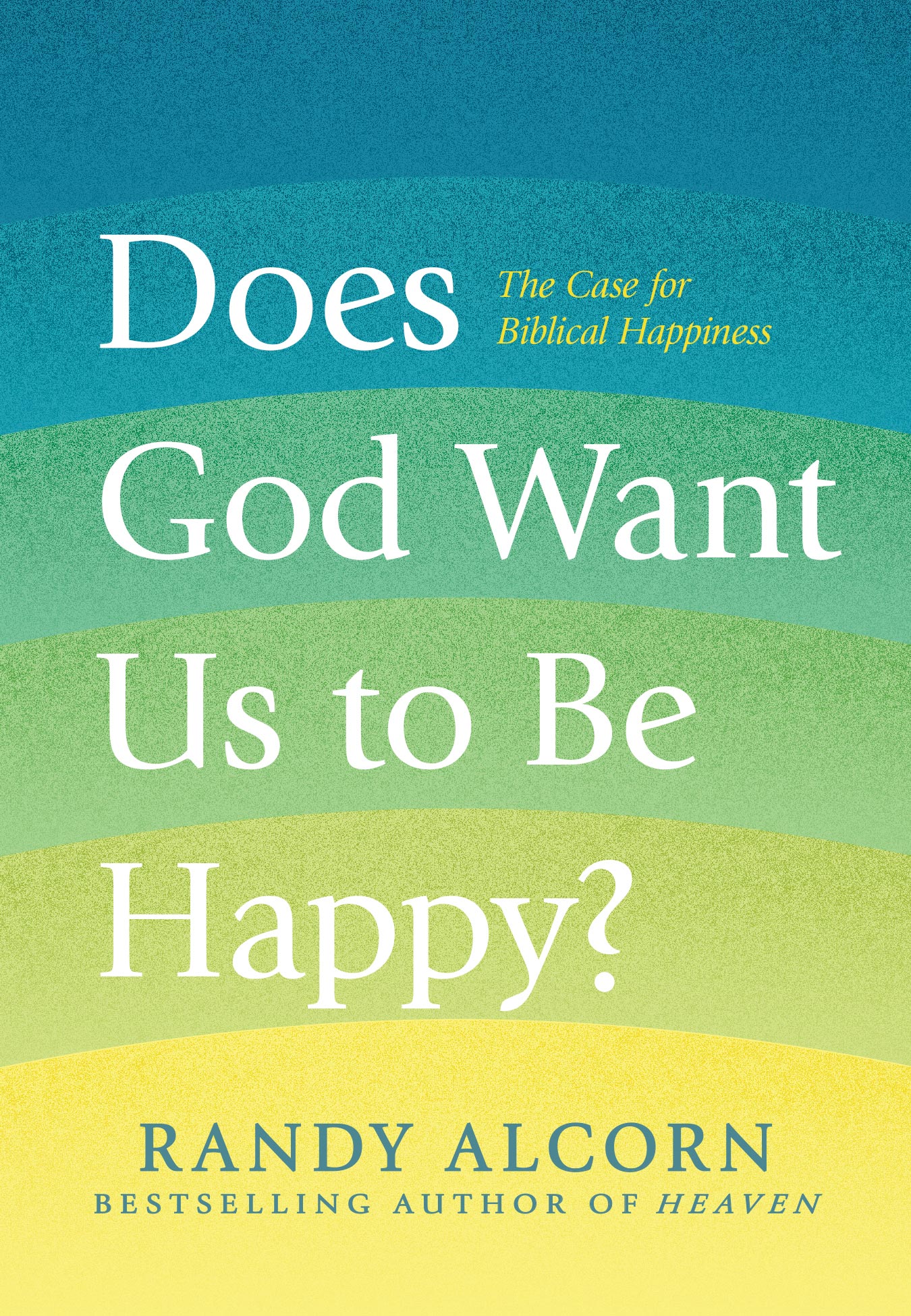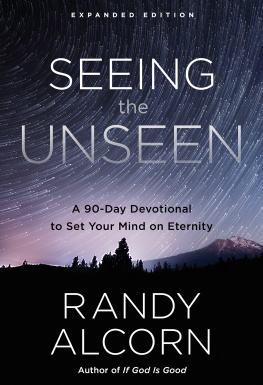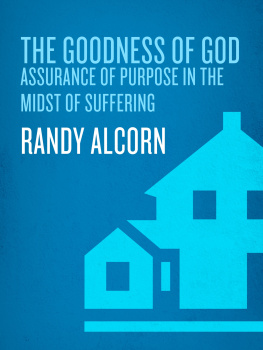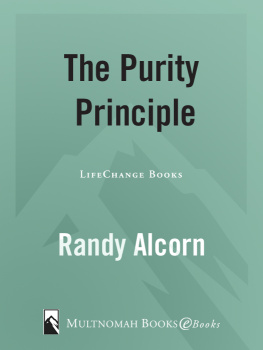Randy Alcorn - Does God Want Us to Be Happy?
Here you can read online Randy Alcorn - Does God Want Us to Be Happy? full text of the book (entire story) in english for free. Download pdf and epub, get meaning, cover and reviews about this ebook. year: 2019, publisher: Tyndale House Publishers, Inc., genre: Religion. Description of the work, (preface) as well as reviews are available. Best literature library LitArk.com created for fans of good reading and offers a wide selection of genres:
Romance novel
Science fiction
Adventure
Detective
Science
History
Home and family
Prose
Art
Politics
Computer
Non-fiction
Religion
Business
Children
Humor
Choose a favorite category and find really read worthwhile books. Enjoy immersion in the world of imagination, feel the emotions of the characters or learn something new for yourself, make an fascinating discovery.

- Book:Does God Want Us to Be Happy?
- Author:
- Publisher:Tyndale House Publishers, Inc.
- Genre:
- Year:2019
- Rating:4 / 5
- Favourites:Add to favourites
- Your mark:
- 80
- 1
- 2
- 3
- 4
- 5
Does God Want Us to Be Happy?: summary, description and annotation
We offer to read an annotation, description, summary or preface (depends on what the author of the book "Does God Want Us to Be Happy?" wrote himself). If you haven't found the necessary information about the book — write in the comments, we will try to find it.
Does God Want Us to Be Happy? — read online for free the complete book (whole text) full work
Below is the text of the book, divided by pages. System saving the place of the last page read, allows you to conveniently read the book "Does God Want Us to Be Happy?" online for free, without having to search again every time where you left off. Put a bookmark, and you can go to the page where you finished reading at any time.
Font size:
Interval:
Bookmark:


Visit Tyndale online at www.tyndale.com.
Visit Tyndale Momentum online at www.tyndalemomentum.com.
TYNDALE, Tyndale Momentum, and Tyndales quill logo are registered trademarks of Tyndale House Publishers, Inc. The Tyndale Momentum logo is a trademark of Tyndale House Publishers, Inc. Tyndale Momentum is the nonfiction imprint of Tyndale House Publishers, Inc., Carol Stream, Illinois.
Does God Want Us to Be Happy?: The Case for Biblical Happiness
Copyright 2019 by Randy Alcorn. All rights reserved.
This book is adapted from Happiness 2015 by Randy Alcorn.
Cover design by Eva M. Winters. Copyright Tyndale House Publishers, Inc. All rights reserved.
Designed by Eva M. Winters
The author is grateful for the helpful counsel of the literary agency, WTA Services LLC, Franklin, TN.
For information about special discounts for bulk purchases, please contact Tyndale House Publishers at , or call 1-800-323-9400.
ISBN 978-1-4964-3257-5 (hc)
Build: 2019-09-03 10:28:53 EPUB 3.0
I F YOU WERE TO ASK a roomful of people what God wants us to do, youd likely get a wide range of answers.
Some people would say he wants us to obey him or to be holy. Others might claim he wants us to love people and stand up for peace and justice. But chances are, you wouldnt hear anyone say, God wants us to be happy.
Most of us have a complicated relationship with happiness. We all want to be happy, but we may feel guilty about this longing. Isnt it selfish to pursue happiness? Isnt it more spiritual to frown than to smile?
In a world full of brokenness, we may wonder if happiness is a worthy pursuit. If we are seeking to follow Jesus, should this quest be written off as superficial and unspiritual?
Maybe youve been taught over the years that God cares about your holiness, not your happiness. This implies we have to choose between the two.
Weve also heard that God calls us to joy, not happiness. According to innumerable sermons and books and blog posts, theres a big difference between joy, which is spiritual, and happiness, which is unspiritual. But does the Bible actually say this? Does God care about our happiness?
The answer might surprise you. Yes, God does care about our happiness. And he has gone to great lengths to prove it.
If you asked any group of people what they want out of life, chances are that most, if not all, would give some form of the same answer: To be happy.
This inborn longing for happiness has been observed for thousands of years by theologians, philosophers, atheists, and agnostics.
Augustine (354430), perhaps the most influential theologian in church history, wrote 1,600 years ago, Every man, whatsoever his condition, desires to be happy.
Nearly 1,300 years after Augustine, the French philosopher and mathematician Blaise Pascal (1623662) wrote, All men seek happiness. This is without exception.
Since then, countless others have observed the same.
Among Christ-followers, happiness was once a positive, desirable word.
Scottish churchman Thomas Boston (16761732) said, Consider what man is. He is a creature that desires happiness, and cannot but desire it. The desire of happiness is woven into his nature, and cannot be eradicated. It is as natural for him to desire it as it is to breathe.
Evangelist George Whitefield (17141770) said, Is it the end of religion to make men happy, and is it not every ones privilege to be as happy as he can?
Whitefield once asked an audience, Does [Jesus] want your heart only for the same end as the devil does, to make you miserable? No, he only wants you to believe on him, that you might be saved. This, this, is all the dear Savior desires, to make you happy, that you may leave your sins, to sit down eternally with him.
Pastor Charles Spurgeon (18341892) said to his London congregation almost 150 years ago, My dear Brothers and Sisters, if anybody in the world ought to be happy, we are the people.... How boundless our privileges! How brilliant our hopes!
Boston, Whitefield, and Spurgeon are just three Christian leaders among many throughout church history who knew that happiness is one of Gods greatest gifts.
Lets be clear: we all know that happiness at the expense of others is wrong.
Is there selfish and superficial happiness? Sure. Theres also selfish and superficial love, peace, loyalty, and trust. But we dont villainize these virtues just because they are sometimes misguided. Likewise, we shouldnt throw out Christ-centered and God-honoring happiness with the bathwater of self-centered happiness.
If we want to be happy but God doesnt want us to be happy, wouldnt that be bad news?
The gospel is called the good news of happiness (Isaiah 52:7, ESV , NASB ). Then why do Christians today often say things like God wants you blessed, not happy
Any message that God doesnt want us to be happy undermines the good news of happiness Jesus came to bring us. Compelling biblical evidence and a long history of Christ-followers have affirmed that our God is pro-happiness.
What if a happy God made us for happiness, and therefore our desire to be happy is inseparable from our longing for God?
What if God wired his image bearers for happiness before sin entered the world?
What if wanting happiness isnt the problem, but looking for happiness in sin is?
What if our desire to be happy can be properly redirected to God and all that he wants for us?
How might this perspective on happiness change our approach to life, parenting, church, ministry, business, sports, entertainment, and everything else?
Since unhappy Christians make the gospel unattractive, wouldnt the gospel become contagiously appealing if Christians embraced happiness in Jesus?
How many of us have ever heard a sermon, read a book, had a discussion about, or meditated on Gods happiness? In fact, were often taught to do exactly the oppositeto squelch our longing for happiness (which will never work).
The resulting silence about or contradiction of biblical revelation about one of Gods great attributes is an immense loss to individuals and families, as well as to the church as a whole.
The title of this book is ironic. If we were thinking correctly, we would naturally wonder, Why would anyone even ask whether God wants his people to be happy?
Some unbelievers might be perplexed by the question Does God want us to be happy? If they did believe in a good God, surely theyd suppose he would value his childrens happiness. What good father wouldnt?
Have you ever met a loving, devoted human father who doesnt want his children to be happy? Sure, he wouldnt want them to sacrifice personal integrity or virtue. But he knows that not having those things will never make them happy anyway! He wants them to make good and right choices that result in their long-term happiness.
The question Does God want us to be happy? makes sense to many of us only because we have been indoctrinated to believe he doesnt. Thats what I was taught after becoming a Christian as a teenager. Millions of others have been taught the same.
Im delighted to say that the Bible itself, along with the beliefs of people throughout church history, have liberated me from this misconception.
Font size:
Interval:
Bookmark:
Similar books «Does God Want Us to Be Happy?»
Look at similar books to Does God Want Us to Be Happy?. We have selected literature similar in name and meaning in the hope of providing readers with more options to find new, interesting, not yet read works.
Discussion, reviews of the book Does God Want Us to Be Happy? and just readers' own opinions. Leave your comments, write what you think about the work, its meaning or the main characters. Specify what exactly you liked and what you didn't like, and why you think so.








